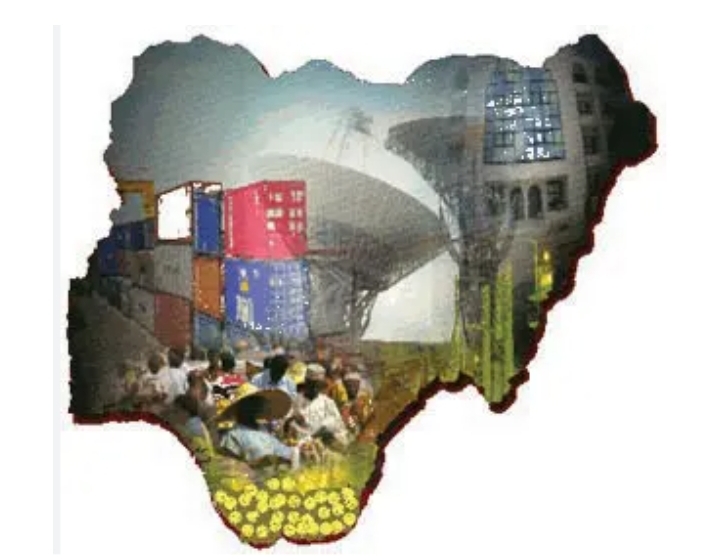With attempts to continually shore up foreign exchange and revenue from non-oil sectors, what is the future of Nigeria’s economy? The answer will depend on the government’s dedication to both short-term and long-term diversification and sustainability plans. And they are critically needed. Because Nigeria has not fared well from its many years of depending heavily on crude oil as its apex source of federal revenue. This became even more obvious in the last decade.
The nation’s gains from crude oil have gradually decreased. Additionally, the government is actively working to clear its external debts – for which reason all fuel subsidies in the country have been removed. Thankfully, the nation has recorded some degree of success at debt servicing under the Tinubu administration – albeit at great expense to Nigerians. It is clear that the future of Nigeria’s economy will benefit from well-planned diversification strategies. It must necessarily include improvements in the oil and gas sector as well – at least to meet short-term energy needs.
Nigeria’s Oil and Gas Sector: Dwindling Returns
Diversification entails increasing the contributions of (all) potential and existing sectors of a nation’s economy. The future of Nigeria’s economy cannot depend on crude oil alone, if the nation must experience genuine socioeconomic growth and well-being of its citizens. Even the crude oil and gas sector in Nigeria is currently experiencing falling prices and returns, which calls for concern.
Available statistics showed that crude oil accounted for just 9 percent of Nigeria’s revenue, and 5.7 percent of its Gross Domestic Product in 2022. Yet again, oil theft has led to the progressively lower crude oil production in Nigeria (in recent times). In fact, Nigeria’s crude oil sector witnessed a recession from quarter 2 of 2020 to quarter 3 of 2022, according to reports.
Data obtained from OPEC showed that Nigeria produced 1.16 million barrels per day in November 2022 on average. But it was generally a downward trend throughout that year.
This worked to Nigeria’s disadvantage; as global oil prices rose above $100 per barrel due to the war in Ukraine. Thus, the nation lost an opportunity to leverage gains from rising oil prices that year. Whereas the UAE accrued AED 125.5 billion in surplus revenue within the first half of 2022 (for the first time in four years). Saudi Arabia also recorded a budget surplus of 40 billion US Dollars in the first three quarters of 2022.
Between December 2023 and February 2024 however, there were fluctuations in Nigeria’s crude oil production. From 1.422 million barrels per day (December 2023), it dropped to 1.419 million bpd (January 2024); then rose to 1.476 million bpd (February 2024).
The Need to Prioritize Diversification Without Ignoring Nigeria’s Oil and Gas Sector
Let us ignore crude oil production for a while. It may seem that the progressively higher contributions of the non-oil sector (over 90 percent) indicates that Nigeria’s economy is now diversified. But for the immediate future of Nigeria’s economy, it is probably not a healthy development.
The crude oil sector remains critical to Nigeria’s modern economic aspirations; it must not be allowed to backslide. If there was no recession in Nigeria’s oil production, the nation’s GDP growth would have been meaningfully higher. The increased revenue would have reduced our debt burden, and boosted the external reserves.
Again, crude oil and gas remain viable sources of energy for industrial and domestic uses across the world, for now. Perhaps it will remain so within the next decade – especially natural gas, which is used to produce electric power in many countries. And Nigeria has an abundance of natural gas, to the tune of about thrice the volume of crude oil. Even though gas projects are known to be capital-intensive, Nigeria must strive to bring more private investors into its gas production sector.
The global drive to invest more in sustainable energy solutions like renewable energy and electric vehicles will not slow down anytime soon. If not for any other reason, it must be sustained for the sake of mitigating climate change. But Nigeria cannot afford to abandon or underservice its crude oil and gas sector while these resources still exist. International and local demand for crude oil and gas may have declined, but the market is still active.
Recommendations Towards the Effective Diversification of Nigeria’s Economy
More than half of Nigeria’s over 250 million inhabitants currently live below the poverty line. And compared to other sectors, Nigeria’s oil and gas industry does not critically contribute to job creation because it is capital-intensive. Thus, the future of Nigeria’s economy critically depends on its successful diversification, with the view to create more jobs. This is an important strategy to mitigate poverty in the country.
Several experts have suggested that there are certain under tapped but highly beneficial sectors of Nigeria’s economy that are important in its diversification plans. These sectors require dedicated, continuous, and critical funding and support from the government, private investors, and global corporations. To safeguard the future of Nigeria’s economy, we must pay more attention to the following sectors:
- Technology/ICT
- Research and development
- Agriculture
- Other extractive minerals
- Local manufacturing industries
- Renewable energy
- Data gathering and analytics
- Boosting of regional trade (through the African Continental Free Trade Agreement)
Additionally, a synergy exists between these sectors which, if they are channeled properly, will lead to a massive economic revolution in Nigeria.
Technology/ICT, Research & Development: Key Sectors in Securing the Future of Nigeria’s Economy
It is even more expedient to make a case for promoting technology/ICT, as well as research & development in Nigeria. The spillover effect of investing adequately in these key sectors will drive innovation and cutting-edge solutions in every other sector of the economy. That includes agriculture, real estate, disaster management, security, healthcare, education, energy, environmental conservation, and more.
Nigeria may do well to learn from Japan – a non-oil producing nation but a global leader in science and technology, backed by research. Israel is another juggernaut in the fields of science and technology, as well as world-class research and development.
For now, a meager 0.2 percent of Nigeria’s GDP goes into research and development. In contrast, at least 2 and 4 percent of the GDP in developed countries goes into servicing research and development. This sector is an important enabler of the discovery and use of new knowledge. It goes further to drive innovation in all other sectors of the economy and eventually, national development.
As such, research and development institutes across the nation will need more funding, collaboration with, and support from the government, private investors, world bodies and multinational corporations. This will guarantee their enduring success.
Additionally, implementing the proposed Science and Technology Policy will be a big win for Nigeria. Unfortunately, the said policy was proposed in the 1960s and reviewed up to 12 times, without any attempt to implement it. The policy makes provisions for setting up the National Research and Innovation Council and National Research Fund. With these in place, the funding and coordination of research in the country will be well catered for.








